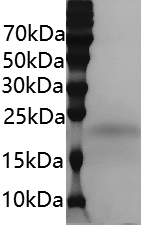| Product name | Mouse GM-CSF protein |
| Sequence | Amino acid sequence derived from Mouse GM-CSF protein isoform (P01587,Met1-Lys141) was expressed. |
| Activity | Measured by its ability to induce proliferation in FDC-P1 cells with a linear range of 0.009-2.5 ng/mL. |
| Protein length | The recombinant Mouse GM-CSF protein consists of 128 amino acids and has a predicted molecular mass of 14.6 kDa. The apparent molecular mass of the Mouse GM-CSF protein is approximately 15-25 kDa in SDS-PAGE under reducing conditions . |
| Preparation method | HEK293 Cells |
| Purity | ≥90 % as determined by SDS-PAGE |
| Alternative | CSF; CSF2; CSF-2; GMCSF; GM-CSF;colony stimulating factor 2 (granulocyte-macrophage); granulocyte-macrophage colony-stimulating factor; Colony-stimulating factor; GMCSF, granulocyte-macrophage colony stimulating factor; molgramostin; Sargramostim, MGC131935; MGC138897; Molgramostim; |
| Formulation | Lyophilized from sterile PBS, pH 7.4. |
| Molecular weight | 14.6 kDa |
| Usage notes | Always centrifuge tubes before opening. It is recommended to reconstitute the lyophilized Mouse GM-CSF protein using the buffer we provided not less than 100 µg/mL, which can then be further diluted to other aqueous solutions. |
| Storage instructions | Lyophilized Mouse GM-CSF proteinshould be stored desiccated below -20°C. Upon reconstitution, the protein should be stored at 4°C between 2-7 days and for future use below -20°C. For long term storage it is recommended to add a carrier protein (0.130% HSA or BSA). Please prevent freeze-thaw cycles. |
| Shipping | The product is shipped at ambient temperature. |
| Precautions | The product listed herein is for research use only and is not intended for use in human or clinical diagnosis. Suggested applications of our products are not recommendations to use our products in violation of any patent or as a license. We cannot be responsible for patent infringements or other violations that may occur with the use of this product. |
| Background | The granulocyte-macrophage colony-stimulating factor (GM-CSF) is an important hematopoietic growth factor and immune modulator. GM-CSF also has profound effects on the functional activities of various circulating leukocytes. It is produced by a variety of cell types including T cells, macrophages, endothelial cells and fibroblasts upon receiving immune stimuli. Although GM-CSF is produced locally, it can act in a paracrine fashion to recruit circulating neutrophils, monocytes and lymphocytes to enhance their functions in host defense. GM-CSF was initially classified as a hematopoietic growth factor. However, unlike its close relatives macrophage CSF (M-CSF) and granulocyte CSF (G-CSF), the majority of myeloid cells do not require GM-CSF for steady-state myelopoiesis. Instead, in inflammation, GM-CSF serves as a communication conduit between tissue-invading lymphocytes and myeloid cells. Even though lymphocytes are in all likelihood the instigators of chronic inflammatory disease, GM-CSF-activated phagocytes are well equipped to cause tissue damage. |
| Gene ID | 12981 |
| Alternative | CSF; CSF2; CSF-2; GMCSF; GM-CSF;colony stimulating factor 2 (granulocyte-macrophage); granulocyte-macrophage colony-stimulating factor; Colony-stimulating factor; GMCSF, granulocyte-macrophage colony stimulating factor; molgramostin; Sargramostim, MGC131935; MGC138897; Molgramostim; |
| Accession | P01587 |

Fig.SDS-PAGE analysis of Mouse GM-CSF protei.
You must be logged in to post a review.
1.The species of antibody reactivity should be the sample species that can be matched normally after Abbkine R&D experts have passed strict scientific verification. If your sample is not within the range of reactivity, in order to improve the efficiency and results of your experiment, it is not suggested to try other species. Otherwise, it may lead to sample mismatch and affect the effect of your experiment.
2.Please aliquot the antibody received as soon as possible and store it at -20℃, avoid repeated freezing and thawing, and use it within one year.
Welcome any form of communications, and better service will be provided here.
Tell: +1-404-854-0155
Email: service@abbkine.com
Support Email: support@abbkine.com
Address: 3052 Stroop Hill Road, Apt 203, Atlanta 30303, Georgia, United States of America




Reviews
There are no reviews yet.